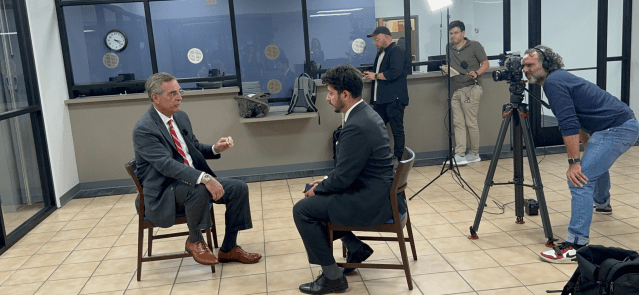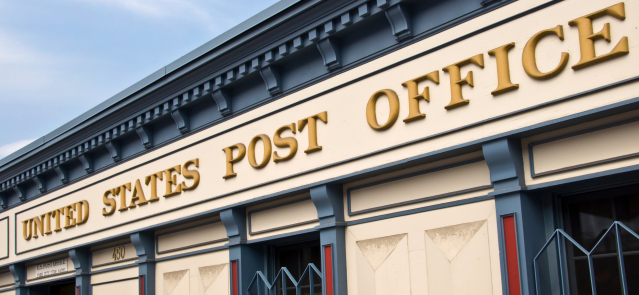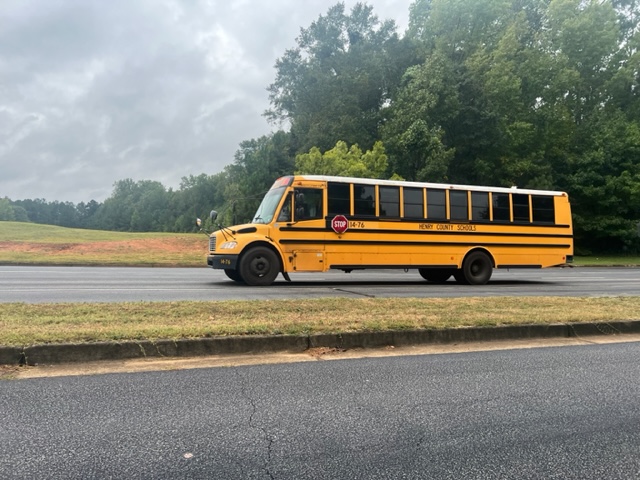Stay ahead of the curve as a political insider with deep policy analysis, daily briefings and policy-shaping tools.
Request a DemoChattahoochee Riverkeeper on environmental concerns and headless goats
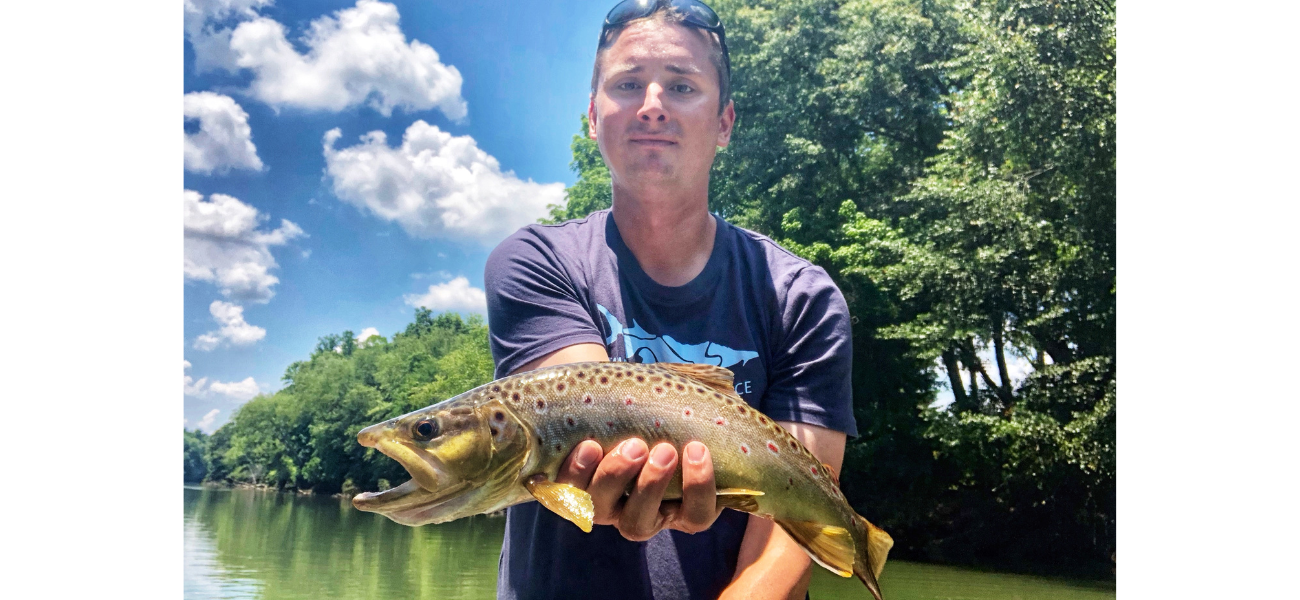
Jason Ulseth, Chattahoochee Riverkeeper. Picture courtesy of Jason Ulseth
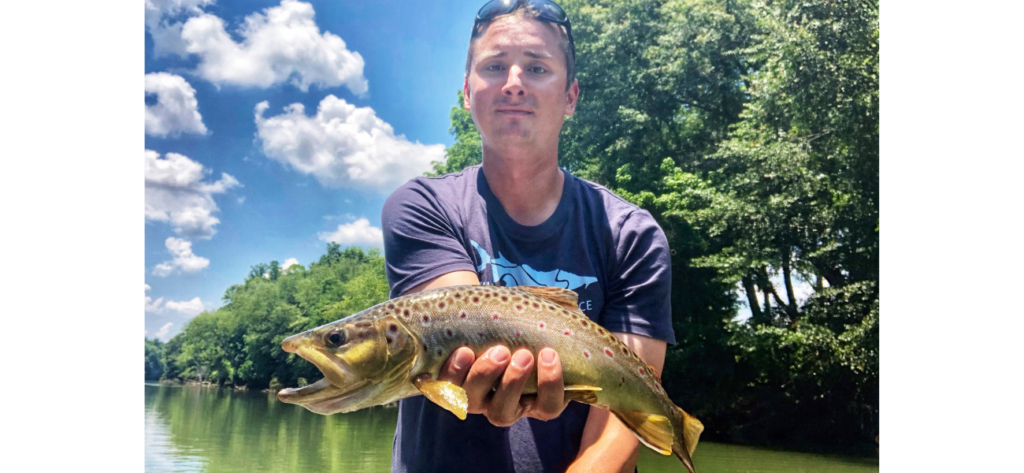
For environmentalist Jason Ulseth, no two workdays are the same and that’s just fine by him.
“I have my boring office days where I’m at the computer, typing emails and working on grant reports,” Ulseth told State Affairs. “But I also have a lot of days where I’m out in the field collecting water samples, investigating a possible sewer spill or oil spill, patrolling the river on our jet boat, working with local government, state, federal agencies on developing campaigns for certain contaminants.”
Then, there are those days when the 41-year-old’s schedule is completely turned on its ear.
“I get a call at 9 o’clock in the morning that a creek is running an off-color or somebody found dead fish in the river. Then I drop everything I’m going to drive two hours to that part of the river, launch our boat and get out there and investigate,” he said, adding “It’s a lot of balancing and juggling with the resources we have. It’s the kind of job I thrive on.”
Having an 18-member staff also helps.
The Chattahoochee Riverkeeper (CRK) organization is one of 300-plus waterkeeper groups worldwide, including eight groups in Georgia. Ulseth heads the largest riverkeeper organization in the state.
In his 16 years with CRK, Ulseth has traversed every mile of the 435-mile Chattahoochee River. He spoke with State Affairs about his goals for the Chattahoochee and the nonprofit river protection group, which occasionally receives small state government grants. And he spills the tea on the ongoing Chattahoochee River mystery of the headless goats found floating in the river; they have numbered more than 600 since 2018.
The conversation has been edited for clarity and brevity.
Q. How did you become interested in environmental issues?
A. My environmental background came from fishing and boating on the river as a child. I wasn’t raised by staunch environmentalists. It was just something that came to me. I was a kid who would much rather be out on the river than at home playing video games. The love of the outdoors is what pushed me when I was in high school and college to dedicate my education towards learning more about it. Then that turned into dedicating my career towards protecting the environment.
Q. How did you become the riverkeeper at Chattahoochee Riverkeeper?
A. Our founding director and Riverkeeper was Sally Bethea. She started the organization in 1994. I was a freshman in high school at the time. I knew about the organization when I was in college and when I was working for the state of Georgia. It was a very respected environmental advocacy organization that I realized was doing a lot of the things I wish that I could be doing as a state regulator. Working for the state government, we certainly had opportunities to protect the environment but that wasn’t always the key mission.
Working for the state and seeing the effectiveness of a nonprofit organization to protect the river, I was very inspired by them and jumped at the opportunity when an opening came up in 2007. I interviewed for the position with Sally and she hired me as the technical programs director. Then when Sally announced she was going to retire, a transition plan was set in place splitting her job into two positions. I became the riverkeeper and our long-term general counsel Juliet Cohen became executive director.
Q. What are your goals as riverkeeper?
A. That every mile of the Chattahoochee and its tributaries is clean for fishing, drinking and swimming.
Q. What is the state of Georgia doing right when it comes to environmental protection?
A. There are a number of local, state and federal agencies charged with environmental protection. A lot of them are doing great things to protect our environment. But the reality is that these agencies typically are underfunded, understaffed, and they just don’t have the resources necessary to adequately protect all of our environmental resources. That’s where nonprofits stepped in to fill that void to make sure we have adequate eyes and ears on our waterways and other areas to make sure they’re sufficiently protected.
Q. What is the state doing wrong?
A. There are a lot of programs that are protecting our resources. But there are a lot of opportunities missed and there are emerging threats that are becoming problematic to our environment and our waterways. For example, emerging contaminants like PFAS [man-made chemicals used in industry and consumer products] and microplastics, things we’re just finding out that are very threatening to our waterways and to our public health. These agencies aren’t moving quickly enough to adequately protect our environment and our public safety from these emerging contaminants. They also don’t have the necessary boots on the ground to follow up on problem areas and to make sure they get resolved.
Q. Which brings us to the mystery of the headless goats. Are you still finding goats in the Chattahoochee?
A. Yep. It’s still ongoing.
Q. When was the last time you saw them?
A. Mid-December. I counted between 20 and 25. They were downstream of Atlanta, South Fulton County, Douglas County stretch. I’m going out there again in a week or two.
Q. Is there a particular area where most of the goats have been dumped?
A. Yeah, primarily off the I-20 Bridge, Interstate 20 which crosses the Chattahoochee. We’ve also seen those that have been dumped from other bridges near that stretch. But it’s all within a couple-mile area, that part of the river near Six Flags.
Q. Is the Georgia Bureau of Investigation looking into it?
A. I’m not at liberty to discuss ongoing investigations.
Q. Do you have an idea who or what is behind these incidents?
A. The leading theory is Santeria, a form of animal sacrifice which requires that the sacrificed animal be placed in nature or in a river. So just based off of my Google research, animal sacrifice of course is nothing new but most practices of animal sacrifice are allowed to eat the sacrificed animal but this particular subset of religion does not allow them to eat [the animal]. They have to actually dispose of the carcass in a natural setting.
Q. What do you do with the bodies?
A. The bodies can weigh 50, 60, 70 pounds, and most of the time, they’re in some level of decomposition. I’m in an 18-foot boat. I don’t have the resources to bring them on board and take them anywhere. We just have to leave them.
Q. Does that cause any harm to the environment?
A. It is a concern, not just for the river but for public safety, and people who may be [enjoying recreation] on that part of the river, which is the primary reason why we want this dumping to be stopped. There’s just nothing that me and one staff person on a little boat can do to collect 15 or 20 goat carcasses.
Q. What about a state agency?
A. So there’s the Wildlife Resources Division of the Department of Natural Resources. Their boat’s smaller than mine.
Q. Isn’t that harmful to the wildlife and fish in that area?
A. In the state of decomposition we find them in, typically they are bloated and floating and are covered with flies and maggots. We haven’t really researched what types of river species could be eating the goats or any potential effects that would have.
Our main concern is pathogens and people [enjoying recreation] on the river come in contact with these degrading animals and any public safety component that goes along with that. We also are aware that there could be especially isolated areas of the Chattahoochee River where dissolved oxygen levels may be affected and other things that could impact fish and wildlife. But we’re not aware of any specific damages that [the dead goats] are causing.
Q. What about people who fish in that area and take the fish home to eat?
A. In terms of eating the fish, I wouldn’t foresee any concerns arising from that. If there’s any pathogens that are in the fish tissues. The fish is being cooked, so that’s going to kill any potential pathogens within the fish tissues. But there could be risk associated with actual contact with the water that the fish was in. If you’re near one of these decomposing animals that could certainly expose you to the pathogens from the carcasses.
Q. How are these dumpings impacting the ecosystem?
A. This is a problem we’ve never encountered, outside of this one stretch of the river in this very specified time period. So we’re not aware of any research that’s been done on large volumes of carcasses being dumped into natural rivers and what those impacts could be on the ecosystem.
We know it’s not natural and we know that it does pose a human health hazard for people. It needs to be stopped.
Q. What other unusual finds have you made in the Chattahoochee?
A. Big-screen TVs, sofas, bed mattresses. Items people don’t want to dispose of properly so they wait until midnight and go to a bridge and dump it into the river. Another big thing we find is tires. Some small tire operations are taking your recycling fees which can be upwards of $3, putting it in their pocket and then dumping hundreds of tires in the Chattahoochee. We find a ton of those.
Q. Are there any environment-related bills in the current session that are of interest to you or Chattahoochee Riverkeepers?
A. There are several bills out right now. One of which is related to the Okefenokee Swamp and adjacent land mining. It’s been a large statewide environmental bill that we’ve been working on with an organization called the Georgia Water Coalition. That’s been the big environmental bill during this legislative session.
Q. What can the average Georgian do to make the environment better?
A. We have a huge problem with littering. When we have citizen cleanup where we take 50 people out to the river and clean up trash, people pick up a plastic bottle or a Styrofoam cup and say, “I can’t believe somebody dumped this in the Chattahoochee River.” They didn’t dump it in the river. They dumped it outside of their [car] window or at the grocery store parking lot, not realizing that when stormwater runoff happens, it picks up all this trash and takes it into the little creek which leads to a bigger creek which then takes it to the Chattahoochee River and our drinking supplies.
People don’t connect the little things they do in their daily lives that actually impact our rivers and our water supplies. Just because you’re in your yard and you’re 15 miles away from the river, [doesn’t mean] what you do there isn’t going to have an impact. Stormwater not only picks up our litter but the fertilizers we put on our lawns, the herbicides we kill fire ants with. All of that winds up in the river. So we have to be cognizant of these little things we’re doing in our daily lives. It all has this huge cumulative impact on our waterways and our water supplies.
Q. Let’s say you get lost in the environment. What three must-haves would you want with you?
A. Clean water, phone and fire.
To learn more about Chattahoochee Riverkeeper and what you can do to protect the river, click here.

the jason ulseth files
- Title: Chattahoochee Riverkeeper
- Age: 41
- Birthplace: Atlanta
- Residence: Johns Creek
- Education: Earned a Bachelor of Science in environmental health, the University of Georgia
- Career: Worked at the Georgia Environmental Protection Division and Georgia Soil and Water Conservation Commission before joining the Chattahoochee Riverkeeper as technical programs director in 2007. Became riverkeeper in January 2015.
- Accomplishments: He is Chattahoochee Riverkeeper’s lead boat captain and is licensed by the United States Coast Guard as a merchant marine officer to captain passenger vessels up to 50 tons. (The biggest boat the Chattahoochee Riverkeeper organization has is 8 tons.). He’s an expert in stormwater management and a certified professional in erosion and sediment control and a Georgia-certified design professional and trainer. In 2019, Atlanta Magazine listed him as one of Atlanta’s Top 500 Most Powerful Leaders.
- Family: He and his wife Dawn have two children.
- Hobbies: When I have a chance, I love to go fishing on Lake Lanier, the Chattahoochee River, taking my kids out hiking and enjoying nature.
- What job would you want to be doing if you weren’t in your current job: I’m living my dream job right now. There’s nothing else I’d rather be doing.
Have questions, comments or tips? Contact Tammy Joyner on Twitter @lvjoyner or at [email protected].
Twitter @StateAffairsGA
Facebook @stateaffairsUS
Instagram @stateaffairsGA
LinkedIn @stateaffairs
Election czar Raffensperger talks challenges ahead of November
DECATUR — Once again, all eyes are on Georgia’s Secretary of State Brad Raffensperger. On Tuesday, the engineer-turned-election czar held a whirlwind day of meet-the-press talks, featuring CBS Evening News, a television crew from Sweden and the regular homegrown press corps that continuously chronicle his every move. The daylong event also was a chance for …
Election officials blast U.S. postmaster ahead of November election for mail delays, poorly trained staff
Leaders of two national groups representing thousands of state and local election workers are imploring the head of the U.S. Postal Service to take “extraordinary measures” to fix the nation’s ongoing mail crisis that has led to lost and delayed election-related mail. The National Association of Secretaries of State and the National Association of State …
Weekend Read: New school buses arrive spring ’25; schools grapple with bus driver shortages
The Gist Georgia has ordered 256 new school buses to relieve the aging fleets in public schools around the state, but most of those new buses won’t be on the road until the end of this school year. What’s Happening “We’ll be looking at springtime before those buses start rolling,” said Ken Johnson, pupil transportation …
Mega Millions has generated over $17M in HOPE, pre-K funding since June
By now you’re acutely aware you’re not holding the winning ticket to this week’s $810 million Mega Millions Jackpot. That honor goes to a Texan who matched all six numbers. Take solace, though, knowing your weekly spending on lottery tickets in Georgia helps preschoolers get an early educational start and pays students’ way through college …

